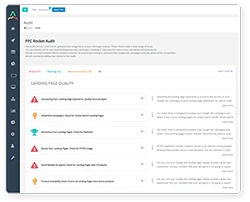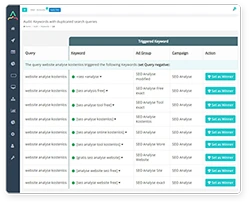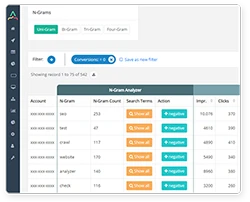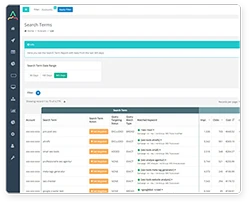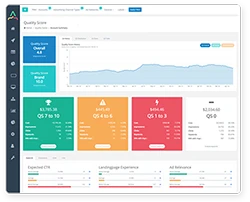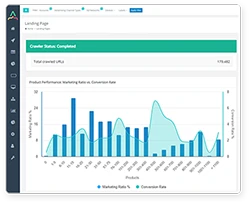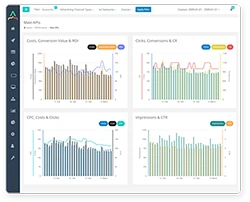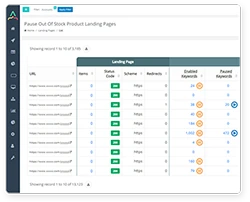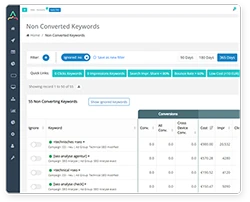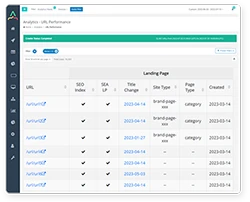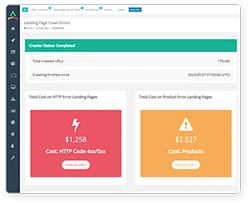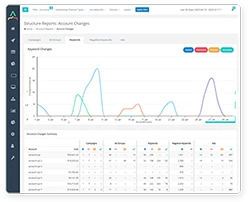Google Ads Keyword Grouping - Introduction
When you think about boosting your brand online, there's this neat trick: grouping keywords within the Google Ads Search Network. Honestly, this could be your golden ticket to shining online. However, mastering Google advertisements keyword grouping can be a challenge. Think of it like sorting your favorite books on a shelf. Sometimes, it's like fitting puzzle pieces together – finding where each keyword belongs.
In our quick guide, we'll pull back the veil and share simple tricks to make your Google Ads adventure even more exciting. We'll use keyword groups, taking a leaf out of Google Advertisements' own method. Excited to dive deep?
Start Creating Better Google Ads
See how PPC Rocket can help you achieve best practices when it comes to Google Ads. Optimize your ad spend with all the tools you need to measure, track, and improve performance.
What Is Keyword Grouping?
Keyword grouping helps organize your target keywords in Google Ads into smaller and more manageable groups known as Ad Groups. Each Ad Group will contain one or more ads that share similar targets and each Campaign is made up of one or more Ad Groups. For every campaign, you can set up 20,000 groups of ads. In each group, you can add up to 50 ads.
Mastering CPC: Budgeting and Organizing Your Google Ads
For every Ad Group, you can pick a price. It's called cost-per-click or CPC. It's like telling Google, "This is what I'll pay when someone searches and my ad shows up." Think of it like setting a budget for your ads each time someone clicks on them.
You can also set the CPC for each individual keyword in the Ad Group. Additionally, you can organize and group your keywords and create top-level keyword groups for better management.
Single keyword ad groups (SKAGs)
are a specific method for creating ad groups. Each SKAG only contains one keyword. SKAGs can be put together using keyword tools, but the most common method these days is to create ad groups for keywords of similar intent.
Why Are Keyword Groups Important for Google Ads?
Picture this: you're sorting marbles by color. When each color has its own little space, it's easier to find exactly what you're looking for, right? Similarly, when you group your keywords neatly, your ads become more precise. They hit the bullseye and connect with what folks are actually searching for.
And trust me, this is crucial, and here is why?
Ever had that sinking feeling of watching your cash and countless hours disappear, like a note in a vast digital ocean, without any trace? It's a heart sink nobody fancies.
You're after that magic moment – the instant someone's eyes light up on your ad and they can't resist tapping it. Each tap? That's another golden opportunity, maybe even a new customer.
Improve relevance, both in your ads and in the landing pages they link to. This will mean an improved quality score which leads to a better price per click and often leads to more conversions too.
Better track your results and see which keywords are performing well so you can adjust your campaigns accordingly.
How to Group Keywords?
By Topic
In the store, you'll find a cozy nook dedicated just to men. Wander a bit, and there's a beautifully adorned section just for women. And guess what? There's a playful, vibrant spot brimming with joy for the kids. It's pretty straightforward, isn't it? Makes things so much smoother!
If you've got many products, think about your keywords. Want to be exact? Group them! For instance, you can have a group for "men’s shorts". Or, you might even split it into "men’s sports shorts" and "men’s dress shorts". Shorter, clear groups can help!
By Match Type
Another method is to group all these keywords by match type. Match types are the different ways your ad can appear in search results. There are three main match types: phrase match, broad match, and exact match.
Broad Match
So you've been hearing about "broad match" in the world of ads, right? Well, think of it as the basic starter pack. It's kind of like a net; it throws out your ads even for words that sound like your keyword but aren't exactly it.
Ever heard of dynamic keyword insertion? It's like magic. Imagine someone searches for "men's shorts", and poof, that exact term appears in your ad text. But here's where it gets tricky: it's best buddies with "phrase match" and "exact match" keywords only. Why? Well, they're like the special sauces - more precise, so our magic trick knows exactly what word to pull into the ad text.
Want to get in on this magic? Be sure to have your keywords on a phrase or an exact match. And, oh, if you want to be extra smart, use negative keywords. That way, you stop your ad from popping up in places it doesn't belong.
A little pro tip from me to you: when you're drafting that perfect ad, keep the wording flexible. Different words might drop in, so you want it to sound smooth. Experiment with your ad messages - who knows, one might be the golden ticket!
Optimizing Marketing Efforts: Precision Meets Broad Targeting
Diving into these little details can really boost your marketing game. It helps make a strong connection with the people you want to reach.
But, remember, sometimes this way can attract folks who aren't really looking for what you offer. This could change how well your campaign does in the end.
Fortunately, once you have been running your campaigns with broad match keywords for a little while, you should have some data available to help you figure out which of the broad match keywords or keyword groupings are most productive and should be concentrated on with higher spending, and which should be added to your negative keyword lists.
Exact Match
"Exact match requires the keyword group to be the only word in the search query, and understanding its search volume is essential for optimizing campaigns. So, for the example of "men’s shorts" only searches like “men's shorts”, “shorts for men”, “shorts men” and ‘men shorts’ will display the ads.
This match type gives you the most control but is also likely to reach fewer searchers than either of the other match types.
Phrase Match
Phrase match requires that the keyword groups be included in the search query, but also allows other words to be included. This match type is one of several match types used in PPC campaigns.
For example, when set to phrase match, the same ‘football shoes keyword would likely display ads for “shoes for football”, “best football shoes for men”, “blue football shoes”, etc.
This type of match, often used in ad groups, is the mid-point between broad match and exact match keyword, so your ads will likely be displayed for more searchers for exact match and less than broad match.
Optimize Ad Group Performance With Strategic Keyword Grouping
By using proper ad groups, your ads will likely show up for more related searches with this method. Focus initially on exact match keywords, then process with phrase and broad match. This approach can lead to higher ROIs for your Ad campaigns.
Remember, you can mix and match these methods when sorting your semantically related keywords, creating a basic hierarchy.
For instance, make one group for general men's clothing keywords. Then, have another for specific women's clothing phrases.
This helps keep things organized and easy to find. Or you could create keyword groups for your exact match keywords about children's clothing, all within the same ad group.
But keep in mind that adding negative keywords to the respective Ad Groups will help you avoid spending your marketing budget inefficiently.
Mastering Keyword Management for Impactful Digital Marketing
In the ever-changing realm of online promotions, it's not enough to just skim the surface; you've got to dive right in. Think of it like a treasure hunt; keywords are the precious gems. Just like you wouldn't dump a mix of diamonds, rubies, and emeralds into one box, you shouldn't group all your keywords together. Instead, give them a home. Organize them, cherish them. Sort them into meaningful groups, just like arranging books on a shelf. Doing this makes your marketing efforts stand strong, ready to dazzle the world.
Remember when you'd fiddle with a radio, trying to find that perfect song? Online ads are a bit like that. It's not always about being the loudest. Sometimes, it's about catching the right rhythm. Think back to those catchy songs you'd find yourself humming to without even realizing it. Well, some keywords are just like those memorable tunes. Group these golden keywords, craft unique ads for each and see how they make your campaign sing.
You know how when you're at a picnic, you can either nibble a bit from every dish or really savor just a few of your favorites? It's a lot like that with keywords. You could scatter your budget around, trying a bit of this and that. Or, you could carefully select just a few, really diving into what each one offers. Remember, it's not about how big your plate is, but rather choosing the flavors that truly resonate with you.
At the day's end, it boils down to this: ensuring each and every cent you spend truly strikes the right chord in your advertising song.
Simple Guide: Boosting Google Ads Using Keyword Grouping
Thinking of improving your Google Ads? Try keyword grouping! Here's a quick way to do it:
Find Your Keywords: First, think about words people would type when looking for what you sell. Write these words down.
Bundle Like Keywords: Got your list? Great! Now group words that are kinda the same. Like "men’s pants" and "pants for guys".
Crafting Tailored Advertisements: Picture this: For every unique bundle you have, you're crafting a distinct ad. Why? It's like handing out a favorite book to a friend who adores that genre. Your ads align perfectly with what folks are typing into their search bars, nudging them to give it a click.
Monitor, Reflect, Adjust: Take a moment, every now and then, to see how the wind's blowing. Which bundles are getting those eager clicks? Need some tweaks here and there? That's the beauty of it! With keyword grouping, navigating and finetuning your Google Ads campaigns becomes a breeze, setting you on a path to ever-better outcomes.
5 Keyword Grouping Tips to Get You Started
Not sure where to begin when optimizing and grouping keywords? These few tips will help you get started quickly and improve your results
Use PPC Rocket’s Keyword Grouping Tool
At PPC Rocket we offer a fantastic tool to help you make the right decisions regarding your keyword grouping.
Consider Your Website
Many businesses follow the layout of their website when arranging Campaigns and Ad Groups, opting to create a keyword grouping approach using a grouping approach based on their site structure. This tactic can optimize the ad rank on search engines and enhance paid traffic and quality score.
For instance, consider the various product categories displayed prominently in your navigation bar. These groups can be split into smaller parts. This gives visitors clearer choices.
Using a broad match modifier is like telling the system, "Hey, these specific words need to show up in what the user searches for. This can ensure that ads show on searches that contain the modified term or close variations, but not necessarily on the same page or order.
By taking a similar approach to grouping all the keywords, you can create a systematic and comprehensive structure. This approach is super helpful to make sure you don't miss out on any important details.
Moreover, by utilizing this strategy, you can more accurately pinpoint the most pertinent landing pages to which you should direct your ads.
Keep Your Ad Group Relevant
When you're working with the Google keyword planner, think of it as one of the best SEO tools out there. Imagine you're sorting your favorite books on a shelf, or organizing search queries in a search engine journal. Even if you have just one book (or ad copy) or only one keyword group in a category, it's essential to create groups. By doing so, you're streamlining your PPC campaigns and ensuring a better ad rank and quality score. This approach helps when people are using search terms to glance over search engine results. They'll see exactly what interests them, especially if you focus on quality scores. So, always bunch together related keywords or even similar keywords. In your Google Ads account, you might decide to have separate ad groups or just one ad group in a campaign. Regardless, it ensures your ads, and the ad-related content, catch the eye of the right audience
Don’t Overfill Your Ad Groups
Don't try to cram too many different keywords into each keyword grouping or keyword list. This will make it harder to target your ads effectively and could result in lower CTRs. Most specialists agree that 3-20 keywords per group or within a keyword list are usually a good rule of thumb for effective keyword grouping.
However, this depends on the keyword group variations and how similar they are. Remember, you can have up to 20,000 Ad Groups per Campaign, so with proper keyword grouping and a strategic keyword list, you can be as specific as you like.
Use Negative Keywords
When delving into the intricate arena of digital marketing, particularly in the realm of search engine advertising, it's not just about pinpointing and leveraging the right keywords. A more nuanced approach involves the comprehensive amalgamation of grouping analogous keywords, rigorous keyword research, search query analytics, and the strategic deployment of negative keywords.
Negative keywords serve as a protective filter, preventing irrelevant or undesired user searches from inadvertently setting off your advertisements. This nuanced method ensures that your advertisements, or relevant ads, are only presented to those genuinely interested, thus optimizing your advertising spend.
To optimize the efficacy of these advertising campaigns, leveraging search volume data and ad relevance as pivotal metrics is essential.
These nuanced exclusions can be adeptly implemented at both the overarching Campaign level or the granular Ad Group level, bestowing search marketers and advertisers with an enhanced degree of precision and command.
By strategically pairing the ideal keywords with the appropriate exclusions, marketers can fully capitalize on the power and reach of their digital advertising efforts.
Strategic Keyword Grouping for Enhanced Ad Relevance
When doing keyword research, it's crucial to consider level keyword groups, creating groups where necessary, as this can provide more granularity in your campaign structure. This process ensures more relevant ads, making it an invaluable tool for search marketers. Landing pages love this strategy too!
Picking the right negative keywords for your ads is like choosing the right ingredients for a recipe. Think of it this way: let's say you're in charge of two different Ad Groups. One's broadly about "women's bags," and the other's specifically about "women's bags on sale.
Now, if you don't want your general "women's bags" ad popping up when someone's hunting for sales, you've gotta be sharp-eyed. Dive deep into the words people use when they search, and you might find that adding "sale" to your negative keyword list for the "women's bags" group is a smart move.
It's like fishing – you want the right bait for the fish you're after. Whether you're showcasing one product or spreading the net for a whole category, you want the right eyes on your ads. But be careful – if you cast too wide or in the wrong spot, you could scare the fish away. The goal? Attract, don’t alarm.
Final Thoughts
Keyword grouping? It's more crucial than most beginners in Google Ads realize. But, get it right and watch your campaigns flourish.
Now, if you're not a keyword whiz or don't have a team like PPC Rocket backing you, things might get tricky. Don't worry! With PPC Rocket's
Keyword Grouping Tool, you can sort your keywords like a pro and boost your campaign game.
Start Creating Better Google Ads
See how PPC Rocket can help you achieve best practices when it comes to Google Ads. Optimize your ad spend with all the tools you need to measure, track, and improve performance.
Share with
Articles
Discover New PPC Marketing Tips, Strategies, and Insights
MAY 31, 2023

Boost E-commerce Sales - Top 5 Essential Google Ads Campaigns
Read on to learn the five essential Google Ads campaigns that can help you drive traffic and increase your sales.
APRIL 15, 2023

The Complete Guide to Google Ads Scripts: Everything to Know
This guide provides a comprehensive overview of creating a successful SEA strategy, including on-page and off-page optimization, keyword research, content creation, and more. By following these tips and techniques, you can improve your website's ranking, drive traffic to your site, and achieve your SEA goals.
MAY 02, 2023

Boost Your Online Presence: 5 Benefits of Google Ads Agencies
Google Ads agencies have a team of professionals who specialize in online advertising, and have experience with Google's algorithms and best practices. They can help businesses create a personalized advertising campaign, manage their budget and maximize ROI, identify their target audience, and provide measurable results. Additionally, they can help businesses develop a scalable advertising strategy to grow with their business.
JUNE 21, 2023

5 Types of Google Ads You Should Maximise for Your Campaigns
In this article, we`ll explore the five types of Google Ads you should maximise for your campaigns. Read on to know more!
4.7 Star (104 reviews)
Customer rating
Start Creating Better Google Ads
See how PPC Rocket can help you achieve best practices when it comes to Google Ads. Optimize your ad spend with all the tools you need to measure, track, and improve performance.
Try PPC Rocket for Free
